Scale name: Vengeance Scale
Scale overview:
The Vengeance Scale is a 20-item self-report inventory with 10 items reversed scored. Each item is rated on a 1 to 7 basis. Alpha values indicate high internal consistency.
Authors:
Noreen Stuckless
& Richard Goranson
Response
Type: 7-point Likert
type.
1 = Disagree strongly
2 = Disagree
3 = disagree slightly
4 = Neither disagree or agree
5 = Agree slightly
6 = Agree
7 = Agree strongly
Subscales: None
Sample
items
It’s not
worth my time or effort to pay back someone who has wronged me. (Reverse score)
It’s
important for me to get back at people who have hurt me.
Psychometric
properties: Study
1: The scale mean for the 20 items was 67.28. Men (71.84) scored significantly
higher than did women (65.29).
Reliability: Study 1 and Study 2 alphas = .92.
In study 3, a test-retest correlation = .90.
Validity: The structure was examined by
Factor Analysis. The researchers concluded that a single factor was the best
fit.
In study 2,
Vengeance scores were negatively correlated with empathy and positively
correlated with trait anger
Availability: See pages 41-42 of the article for
the 20 items.
Read more about revenge:
Revenge, Vengeance and Retaliatory Aggression.
Reference
Stuckless,
N. & Goranson, R. (1992). The vengeance scale: Development of a measure of attitudes
toward revenge, Journal of Social Behavior and Personality, 7, 25-42.
Note. If you buy a book I may earn a royalty and some clicks may lead to commissions.
Reference
for using scales in research:
Buy Creating Surveys on
 |
Reference
for clinicians on understanding assessment
Buy Applied Statistics for
Counselors
Resource Link: A – Z Test Index
Links to Connections
Checkout My Website www.suttong.com
See my Books
FOLLOW me on
FACEBOOK Geoff
W. Sutton
TWITTER @Geoff.W.Sutton
PINTEREST www.pinterest.com/GeoffWSutton
Read published articles:
Academia Geoff
W Sutton
ResearchGate Geoffrey W Sutton


Comments
Post a Comment